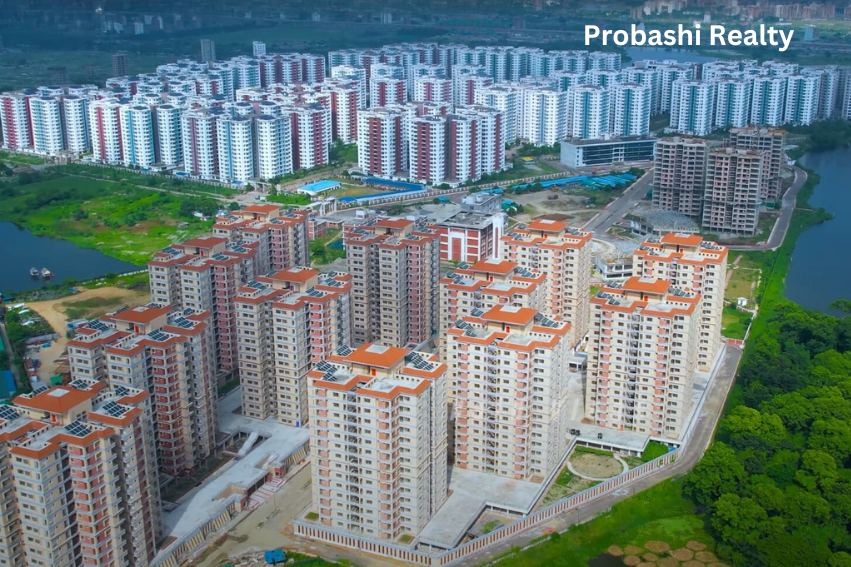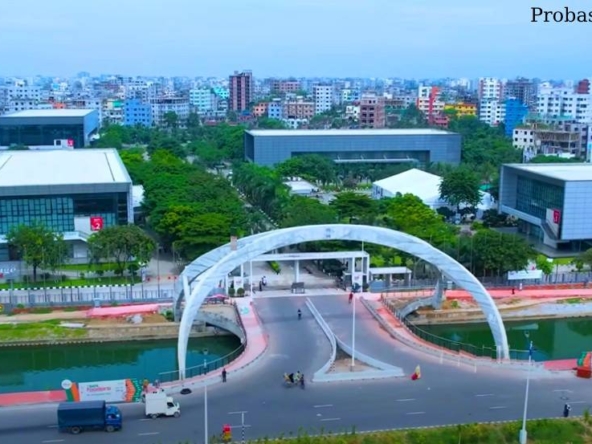The real estate market in Bangladesh exhibited several notable trends and characteristics:
-
Urbanization and Population Growth: Bangladesh has been experiencing rapid urbanization and population growth, particularly in major cities like Dhaka, Chittagong, and Khulna. This urban expansion drives significant demand for residential, commercial, and infrastructure development.
-
Residential Market: The residential real estate sector is a major component of the market, with increasing demand for housing driven by population growth and urban migration. The demand spans various segments, from affordable housing to luxury apartments. In Dhaka, for instance, high population density and limited land availability contribute to rising property prices.
-
Commercial Real Estate: The commercial real estate market in Bangladesh is also growing, driven by the expansion of businesses, retail, and the service sector. There is increasing demand for office spaces, shopping malls, and mixed-use developments in urban centers.
-
Government Policies and Initiatives: The Bangladeshi government has implemented various policies to support the real estate sector, including incentives for developers, regulatory reforms, and investment in infrastructure projects. Initiatives like the construction of new roads, bridges, and public transport systems aim to improve connectivity and support urban growth.
-
Affordable Housing: Affordable housing remains a critical issue in Bangladesh, with a significant portion of the population requiring low-cost housing solutions. The government and private sector are working on projects to provide affordable housing options, though challenges such as high land prices and construction costs persist.
-
Foreign Investment: The real estate market in Bangladesh has been attracting interest from foreign investors, particularly from neighboring countries and the Bangladeshi diaspora. Foreign investment is driven by the country’s economic growth prospects and the potential for high returns in the real estate sector.
-
Challenges: The Bangladeshi real estate market faces several challenges, including regulatory hurdles, land acquisition issues, and infrastructure deficiencies. Additionally, the market can be volatile, with fluctuations in property prices and demand influenced by economic conditions and policy changes.
-
Infrastructure Development: Significant infrastructure projects, such as the Dhaka Metro Rail, Padma Bridge, and various expressways, are expected to have a positive impact on the real estate market by improving connectivity and accessibility, thereby enhancing the attractiveness of surrounding areas for residential and commercial development.
-
Sustainability and Green Building: There is a growing awareness of sustainability and environmentally friendly building practices in Bangladesh. Developers are beginning to incorporate green building technologies and energy-efficient designs into new projects, supported by government incentives and increasing consumer demand for sustainable living options.
Overall, the real estate market in Bangladesh offers opportunities for growth and investment, driven by factors such as urbanization, economic development, and government initiatives. However, it also faces challenges related to affordability, regulatory complexity, and infrastructure needs. The future of the market will likely be shaped by ongoing urbanization trends, policy developments, and investment in infrastructure and affordable housing.
Bangladesh Real Estate Tips:
Navigating the real estate market in Bangladesh requires careful consideration of various factors. Here are some tips to help you along the way:
-
Understand the Market Dynamics: Bangladesh’s real estate market can vary significantly depending on the region and type of property. Research recent trends, property prices, and market conditions in the specific area you’re interested in. Consider factors such as supply and demand, economic growth, and urban development plans.
-
Location Research: Bangladesh offers a range of locations, each with its own unique characteristics and property market dynamics. Consider factors such as proximity to amenities, transportation links, job opportunities, schools, and lifestyle preferences when selecting a location. Major cities like Dhaka, Chittagong, and Sylhet have different dynamics compared to smaller towns or rural areas.
-
Legal and Regulatory Considerations: Familiarize yourself with the legal and regulatory framework governing real estate transactions in Bangladesh. Understand the process of buying property, including ownership rights, taxes, fees, and legal requirements. Consider consulting with legal professionals who specialize in Bangladeshi real estate law to ensure compliance.
-
Budget Wisely: Determine your budget for purchasing property in Bangladesh, taking into account your savings, income, expenses, and borrowing capacity. Factor in additional costs such as taxes, legal fees, registration fees, property transfer fees, and maintenance expenses. Consider whether you’ll be financing the purchase through a mortgage or other means.
-
Engage Local Experts: Consider working with local real estate agents, lawyers, and other professionals who have expertise in the Bangladeshi property market. They can provide valuable insights, assist you with property search and purchase, negotiate on your behalf, and navigate legal and administrative procedures.
-
Due Diligence: Before making an offer on a property, conduct thorough due diligence to assess its legal, financial, and structural aspects. This may include obtaining property title searches, land surveys, building inspections, and reviewing property documents. Consider hiring professionals such as surveyors, engineers, or architects to assist with due diligence.
-
Negotiate Terms and Conditions: When making an offer on a property, be prepared to negotiate terms and conditions with the seller. Consider factors such as the purchase price, payment schedule, deposit amount, and any contingencies. Your real estate agent or lawyer can provide guidance and support throughout the negotiation process.
-
Legal Assistance: Seek legal advice from a qualified Bangladeshi real estate lawyer before signing any contracts or agreements. A lawyer can review the purchase contract, explain legal terms, and ensure that your interests are protected throughout the transaction.
-
Consider Long-Term Investment: Think about the long-term potential of the property as an investment. Research market trends, rental yields, and potential for capital appreciation in the area. Consider factors such as economic growth prospects, urbanization trends, and infrastructure development.
-
Stay Informed: Stay updated on developments in the Bangladeshi real estate market, including changes in regulations, government policies, and market trends. Follow industry news, attend seminars or workshops, and consult with experts to make informed decisions.
-
Check Developer’s Reputation: If you are purchasing a property in a new development, research the reputation and track record of the developer. Look into their previous projects, construction quality, and delivery timelines. A reputable developer can significantly reduce risks associated with off-plan purchases.
-
Understand Financing Options: Explore financing options available in Bangladesh, such as home loans and mortgages offered by local banks and financial institutions. Understand the requirements, terms, and interest rates associated with each option. Securing pre-approval for a loan can strengthen your position as a buyer.
By following these tips and conducting thorough research, you can navigate the Bangladeshi real estate market effectively and make sound investment decisions.



